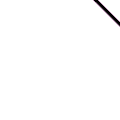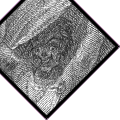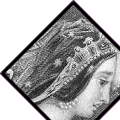


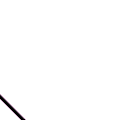


Here, the focus is on a single poem--"He touched me." In addition, however, at the bottom of this page is one other Dickinson poem--"It would never be Common." This poem also invokes the East and may be read in the context of nineteenth-century orientalism and Dickinson's idiosyncratic use of orientalist tropes.
********
Publishing history and critical reception of "He touched me."
When "He touched me" first appeared in print it was without the last stanza. It is the last stanza, however, that is perhaps most interesting. It mentions two women--Rebecca of Jerusalem and a Persian who is baffled at her shrine (probably a reference to Lalla Rookh)--and both are famous not for traditional female adoration of a larger-than-life heroic male, but rather intense female sexuality coupled with rich spiritual passion.
Below are several versions of "He touched me." The first version is a digital scan of the manuscript, and this is followed by a type translation of the manuscript. Then there are examples of various print renderings: the poem's first appearance in 1896; a 1947 magazine version that may be the first print version to include the last six lines; the 1955 Johnson version; and the 1998 Franklin version (which represents the poem as four instead of three stanzas).
A. Electronic image of the holograph:
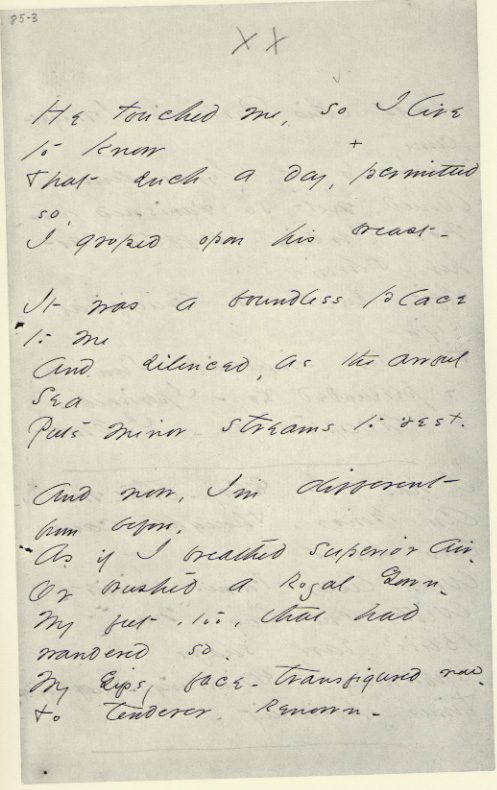
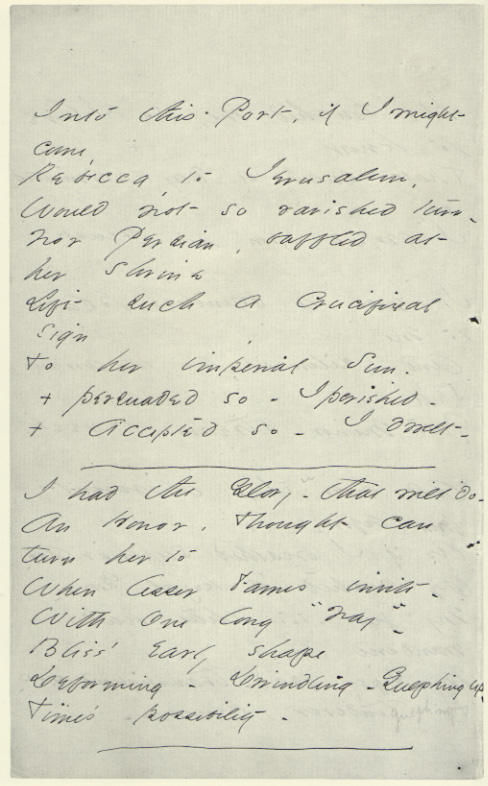
-----
B. Typed translation of above image:
He touched me, so I live
to know +
That such a day, permitted
so,
I groped upon his breast -
It was a boundless place
to me
And silenced, as the awful
Sea
Puts minor streams to rest.
And now, I'm different--
from before,
As if I breathed superior air -
Or brushed a Royal Gown -
My feet, too, that had
wandered so -
My Gipsy face - transfigured now -
To tenderer Renown -
Into this Port, if I might -
come,
Rebecca, to Jerusalem,
Would not so ravished turn -
Nor Persian, baffled at
her shrine
Lift such a Crucifixal
sign
To her imperial Sun.
+ persuaded so - I perished -
+ accepted so - I dwell
-------
C. Below is probably the first print version of the poem. See Poems by Emily Dickinson, Third Series, ed. By Mabel Loomis Todd, Boston: Roberts Brothers, 1896, p. 92. The poem was included in the section entitled "Love." (Interestingly, "He touched me" did not appear in the 1890 or 1891 editions of Poems.)
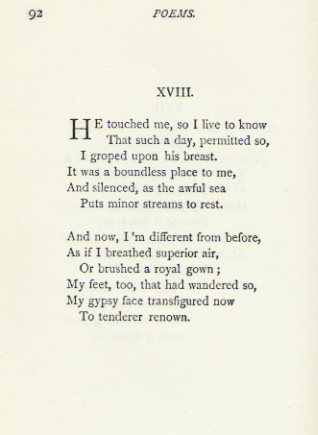
He touched me, so I live to know
That such a day, permitted so,
I groped upon his breast.
It was a boundless place to me,
And silenced, as the awful sea
Puts minor streams to rest.
And now, I'm different from before,
As if I breathed superior air,
Or brushed a royal gown;
My feet, too, that had wandered so,
My gypsy feet transfigured now
To tenderer renown.
(This same version appeared in The Poems of Emily Dickinson, ed. By Martha Dickinson Bianchi and Alfred Leete Hampson, Boston, 1936, p. 151-52. Again, the poem is included in the third section, "Love." Oddly, the poem is not cited in the index of first lines. The 1936 print version, as well as versions in 1924 and 1930, like the first print version in 1896, omit the last six lines.)
------
The poem appears for the first time, it seems, with the last six lines, in New England Quarterly 20 (March 1947), p. 22.
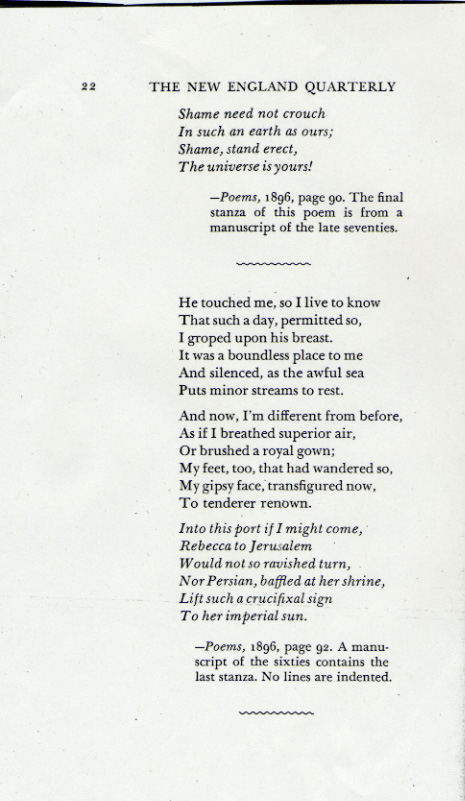
---
In Poems, 1955, Thomas Johnson renders the poem in three six-line stanzas, labels it #506, and dates it c. 1862.
He touched me, so I live to know
That such a day, permitted so,
I groped upon his breast--
It was a boundless place to me
And silenced, as the awful sea
Puts minor streams to rest.
And now, I'm different from before,
As if I breathed superior air--
Or brushed a Royal Gown--
My feet, too, that had wandered so--
My Gypsy face--transfigured now--
To tenderer Renown--
Into this Port, if I might come,
Rebecca, to Jerusalem,
Would not so ravished turn--
Nor Persian, baffled at her shrine
Lift such Crucifixal sign
To her imperial Sun.
-----
In Franklin's 1998 variorum edition, he notes that there is only one manuscript version of the poem (in Fascicle 17). He renders the poem in four stanzas--3/3/6/6--and he labels it #349. Franklin suggests the summer of 1862 as a composition date, and he notes no variants.
He touched me, so I live to know
That such a day, permitted so,
I groped upon his breast -
It was a boundless place to me
And silenced, as the awful Sea
Puts minor streams to rest.
And now, I'm different from before,
As if I breathed superior air -
Or brushed a Royal Gown -
My feet, too, that had wandered so -
My Gypsy face - transfigured now -
To tenderer Renown -
Into this Port, if I might come,
Rebecca to Jerusalem,
Would not so ravished turn -
Nor Persian, baffled at her shrine
Lift such a Crucifixal sign
To her imperial Sun.
--------------
In thinking about Dickinson's use of orientalist tropes, "It would never be Common" is worth study.
What follows is a type transcription of the image above:
It would never be Common -
More - I said -
Difference - had begun -
Many a bitterness - had been -
But that old sort - was done -
Or - if it sometimes - showed -
As 'twill -
Opon the Downiest - morn -
Such bliss - had I - for all
the years -
'Twould give an easier - pain -
I'd so much joy - I told it - Red -
Opon my simple cheek -
I felt it publish - in my eye -
'Twas needless - any speak -
I walked - as wings - my body bore -
The feet - I former used -
Unnecessary - now to me -
As boots - would be - to Birds -
I put my pleasure all abroad -
I dealt a word of Gold
To every Creature - that I met -
And Dowered - all the World -
When - suddenly - my Riches shrank -
A Goblin - drank my Dew -
My Palaces - dropped tenantless -
Myself - was beggared - too -
I clutched at sounds -
I groped at shapes -
I touched the tops of Films -
I felt the Wilderness roll back
Along my Golden lines -
The Sackcloth - hangs upon the
nail -
The Frock I used to wear -
But where my moment of Brocade -
My - drop - of India?
Critical Issues | Student Projects | Bibliography


